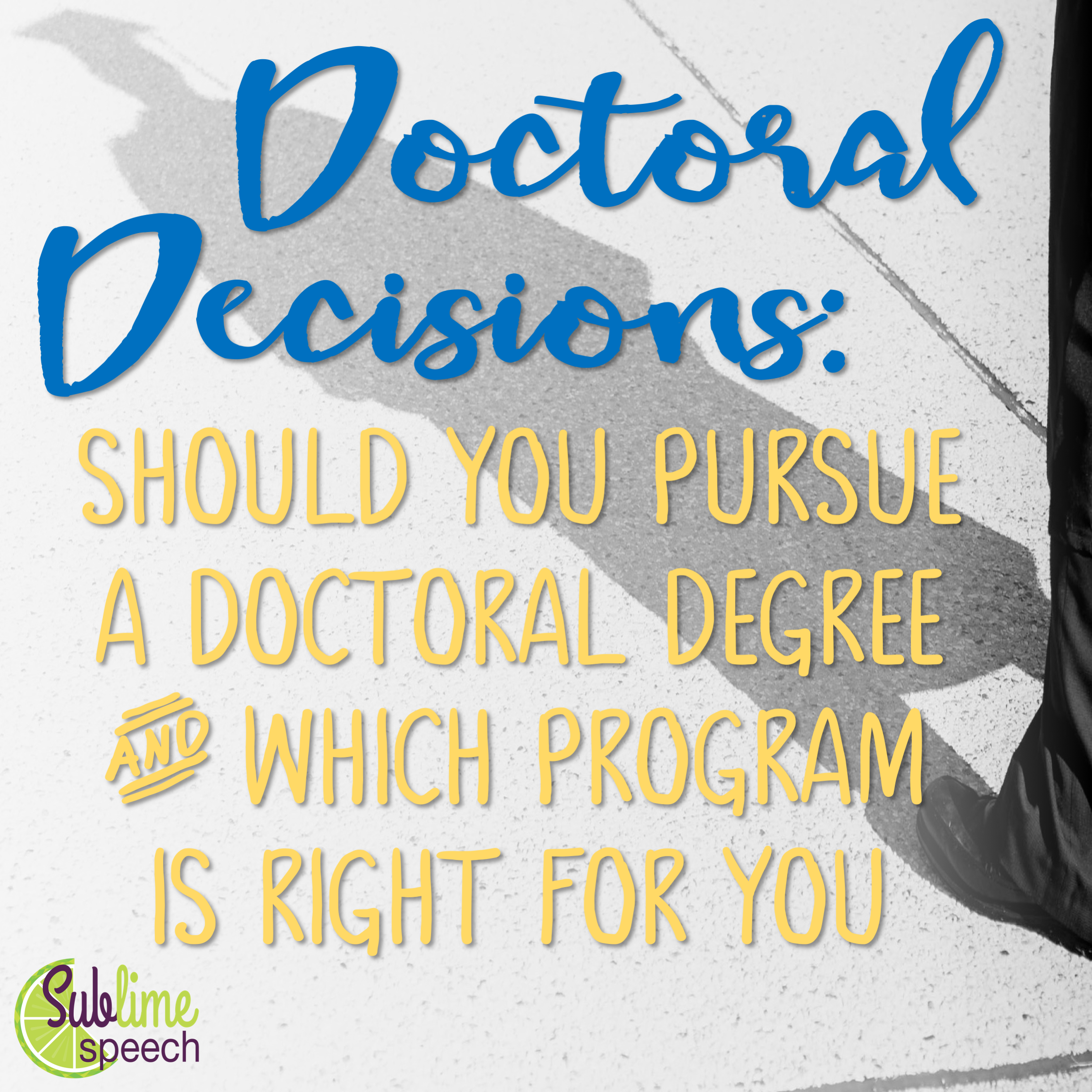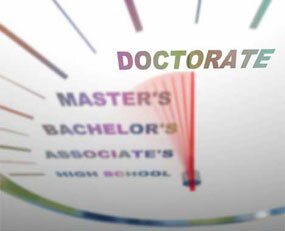
Speech-Language Pathologists have been required to obtain a master’s degree (or equivalent) since 1965 and since 1993 a master’s/doctoral degree has been required with equivalency no longer accepted. The majority of our master’s level degrees require about 20 more credit hours than many other master’s degree programs. However, the scope of our profession continues to expand and the need for highly-qualified SLPs is on the rise spawning a new debate about entry-level SLP certification requiring clinical or research doctorate degrees. This discussion, as well as a desire to increase their knowledge and specialization, has led some SLPs to contemplate continuing their education.
If you would have asked me in my final year of graduate school if I would ever consider a doctorate degree I may have laughed and emphatically stated NO! Well… I was wrong. I started considering a doctorate degree about 2 years ago when the first programs for clinical doctorates (CScD/SLPD) were emerging. I wanted to share some information that I learned about all of the available routes to masters-level SLPs and which program I ultimately decided on… it may surprise you! Read on!
Leads to: PhD
Prepares you: for a faculty/researcher career to contribute to the body of knowledge that advances speech-language pathology as a discipline.
Where PhDs typically work: Colleges/universities, public/private agencies, research institutions industry, etc.
Time to complete: 3 – 5 years (with a master’s degree in SLP); 2 – 3 years (with a previous clinical doctoral degree) – Research/Dissertation required
Requirements: A master’s/clinical doctoral degree and an area of interest for research
This program may be best suited for you if you have an interest in the science behind your area of study. Do you have questions and there aren’t answers? Are you interested in a career focused on research, instruction, and presenting? A PhD is best suited for you if you are in a position to work part time or to dedicate your time to your PhD full-time at different times throughout the program. A PhD might not be suited for you if the idea of research and writing to become published gives you the Heebie-Jeebies. While there may be some PhD programs that do not require a nearly full-time commitments at times throughout the program, many are a full-time commitment. While some universities will pay for you to obtain the degree, you may need loans or outside income sources throughout the program depending on how it is laid out. With a PhD in CSD/SLP, you are unlikely to see much of a salary bump within schools or medical fields. This degree is focused on providing you with the skills to: apply the scientific method to the development of original research questions that have relevant implications for the discipline; critique and synthesize available research; design research studies, and analyze and disseminate results; implement independent and collaborative research; lead research initiatives and teams; secure research funding; and prepare and mentor future professionals and scientists. (from ASHA)
Clinical Doctoral Degree
Leads to: CScD, SLPD (depends on program – not a consistent at this time)
Prepares you: to become a master clinician (area of specialty); to become clinical educators or administrators; to become leaders in the clinical setting or specialty area; to become collaborators and supporters of clinical research.
Where CScD/SLPDs typically work: All areas of practice including schools/districts, private practice, clinics, hospitals, etc. While some universities hire MS/Doctoral level clinicians, this degree does not typically lead to careers in universities.
Time to complete: 2 – 3 years following a master’s degree in speech-language pathology
Requirements: A master’s degree in speech-language pathology
This program may be best suited for you if there is an area in our field of CSD/SLP that you would like to become highly skilled in. While you will likely work on a large project as part of your program, you are unlikely to conduct research and publish a formal dissertation. Some of the coursework for this program may involve leadership, supervision, policy, business, organizational behavior/leadership, research implementation, etc. This degree focuses more on expanding your overall knowledge in the area of CSD. As this is typically a part-time, online, or hybrid program, most are designed for the working SLP. This means that you would not need to cease working to obtain this degree. However, it is very unlikely that schools with this program would provide tuition scholarships for the program. Some programs can be up to about $60,000 total for 2-3 years of courses. Before beginning this program, you may want to see if the investment will result in increased salary afterward to assist with paying of the additional loan/tuition amounts. This program may not be suited for you if you will not financially be able to support the tuition or loan repayments, do not have time within your current schedule for additional time spent reading and participating in class activities and assignment, or if you don’t believe that the courses and outcome of this program will be of a personal or professional benefit to you.
Doctor Of Education (optional Emphasis In Special Education)
Leads to: EdD
Prepares you: to become a leader in education (and with the emphasis area, in special education)
Where EdDs typically work at: School district administration, school administration, state agencies, advocate agencies
Time to complete: 3 – 5 years following a master’s degree/specialist’s degree – Research/Dissertation required
Requirements: Varies – Depends on program/state. Typically a master’s degree and/or specialist’s degree in education (some will accept a master’s degree in speech-language pathology with experience working in schools)
This program may be best suited for you if you would like to specialize in the area of special education in schools – namely public schools. It may also be best suited for you if you would like to pursue leadership opportunities in school districts, agencies, and state-level positions. This program is typically part time, online, or hybrid and therefore is well-suited for those wishing to work while pursuing their degree. This program is likely to require research and/or a dissertation. There may be additional state requirements for administration licensure that may be fulfilled by this program but the majority of these requirements are addressed in master’s or specialist degrees. This degree program will include courses on research, law, supervision, fiscal management, leadership, cultural issues, and more. A large portion of coursework in the majority of EdD programs is research/dissertation. This program may not be suited for you if you do not want to hold an administrative position, would like to focus on speech-language pathology, or do not want to work in school districts or other public agencies.
Other options mentioned by SLPs in various groups include: Doctoral Degree in Audiology (AuD); Additional master’s degrees in business or other areas; Doctoral degree in curriculum/instruction, applied linguistics, neuroscience, early childhood education, health care administration, public health, etc.
So… If you were to achieve an additional degree, which would you choose?
I initially considered an SLPD as I wanted to increase my knowledge in therapy provision. However, after becoming Lead SLP in my district, I saw the need for leadership and administrators with knowledge of special education. As I worked in this capacity I found that I could have an impact on a larger scale from within the administration circle. I also found a university within the area that I am living that accepted my master’s degree in SLP and experience in schools and accepted me into their EdD program. Technically, my program is a Doctor Of Education in Organizational Leadership with an Emphasis in Special Education. This program will take approximately 3 years to complete coursework and then additional time to complete my dissertation. Typically, students complete the full program within 4 years. I take 1 class per week on campus, except for the special education emphasis courses which will be online. While this program will require additional loans, the university has a scholarship for those working in my school district. I plan to update the blog with occasional posts about the program and the journey.
Anything to add to this post? Personal experiences, questions, and comments are always welcome in the comments section below!



You GO Girl! The field of special education needs more people like you who have a more rounded view of the entire population, and the impact a speech;/language disorder has on the individual. It also helps knowing where speech is PART of the impairment, NOT the impairment itself. Congratulations on your decision. Reach out for any help you may need – you have 2 years before I retire 🙂